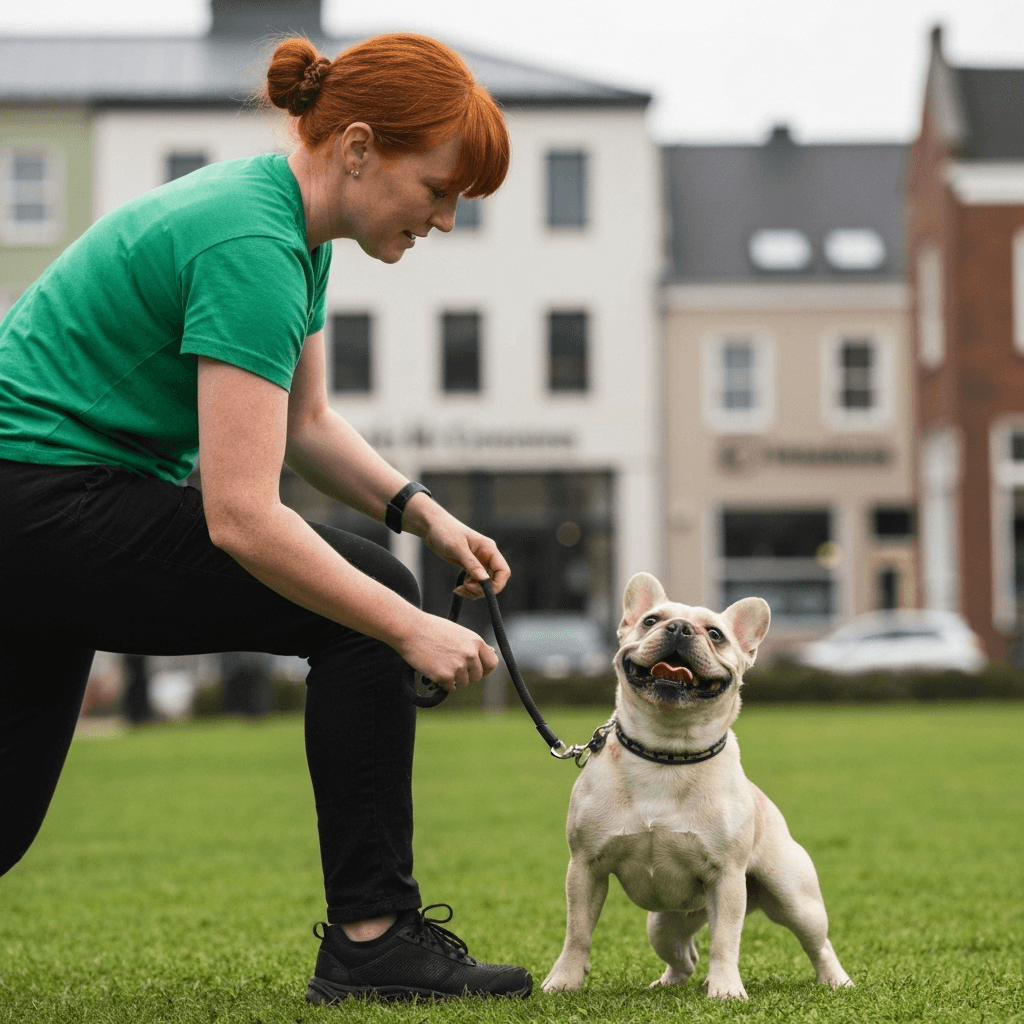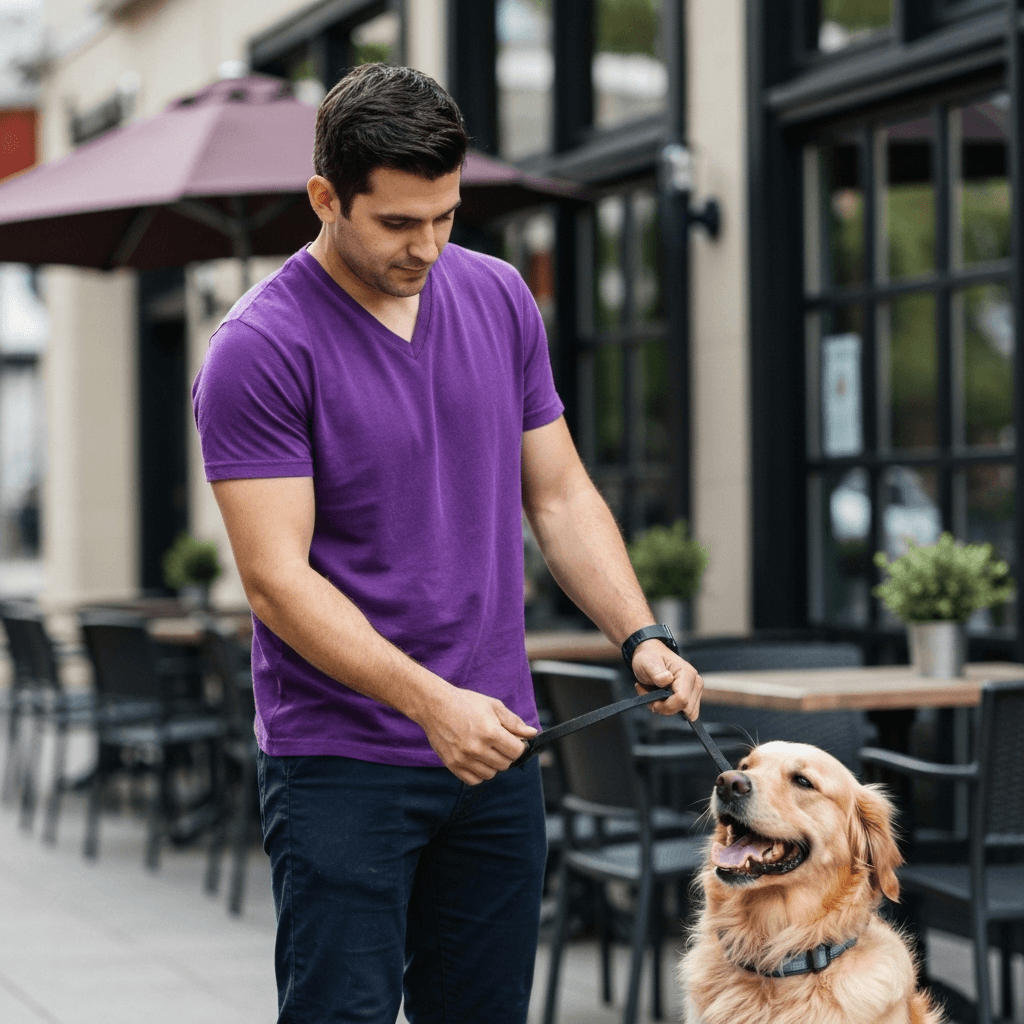Your Complete Guide to Choosing a Dog Trainer in Wisconsin
Living with a dog in Wisconsin means navigating everything from busy Madison sidewalks to quiet lake trails in the Northwoods. Your dog needs to handle it all – sitting calmly at a Green Bay Packers tailgate, walking politely past deer on forest paths, and greeting neighbors at summer festivals without jumping.
The key is finding a trainer who gets Wisconsin life and can teach your dog the skills that matter here. Most dog rules come from your city or county, so you want someone who knows those local details and can help you follow them without stress.
How to Choose the Right Trainer
Start with positive reinforcement training that builds skills through rewards, not fear. This approach keeps your dog happy to learn and makes it much easier to follow local leash laws and noise rules when you’re out and about.
Look for real credentials when comparing trainers. Good ones to know include KPA-CTP and CPDT-KA for general training skills. If your dog has serious behavior issues like aggression or severe anxiety, you’ll want someone with advanced credentials like IAABC-CDBC or CBCC-KA. Programs like CTC and hands-on tests like CPDT-KSA show the trainer can actually work with dogs, not just pass written tests.
Think about what works for your life. In-home dog training is perfect when you need help with specific problems like door jumping, backyard barking, or pulling on neighborhood walks. Group classes teach your dog to focus around other dogs and people. Private lessons let you move at your own pace and tackle exactly what you need. If you’re really pressed for time, day training or a short board and train program can give you a head start.
One thing to note – if a trainer runs a business that sells dogs or operates certain boarding facilities, they might need a state license. You can check the details at Wisconsin DATCP's Dog Seller and Dog Facility Operator Program.
Common Dog Training Methods Explained

The best training methods help your dog learn calmly and stick with good habits even when things get exciting. Here’s what most Wisconsin dogs need to master.
Basic obedience covers the essentials – sit, down, stay, place, recall, and loose leash walking. These skills make everything easier, from waiting at crosswalks to sitting politely while kids pet your dog at the farmers market.
Puppy training focuses on the big stuff that shapes your dog’s whole life. Good potty training, crate comfort, early leash training, and meeting lots of different people and situations while they’re young. Getting this right early saves you months of fixing problems later.
Behavior modification tackles the tougher issues like reactivity toward other dogs, fear of strangers, resource guarding, and separation anxiety. This work requires patience and often coordination with your vet, so make sure your trainer has a clear, step-by-step plan.
Group classes and puppy classes add controlled distractions that help your dog learn to behave well around others. It’s one thing to sit in your kitchen – it’s another to do it when there are five other dogs nearby.
Private lessons let you work on exactly what matters most to you and your dog. Whether that’s stopping counter-surfing or building confidence around strangers, you get personalized attention every session.
For specialized training like therapy dog training or service dog training, you’ll need a trainer who understands the specific requirements and can honestly assess whether your dog is suited for that work.
If you’re dealing with aggressive dog training, choose a certified dog trainer with behavior credentials who uses humane methods. Safety comes first, and the right trainer will help you manage risk while working on the underlying issues.
Average Cost of Dog Training in Wisconsin (Updated for 2025)
Training costs vary quite a bit depending on where you are in Wisconsin and what kind of help you need. Here’s what most dog owners are paying in 2025.
| Service Type | Average Cost (Wisconsin) |
|---|---|
| Puppy classes (4–6 weeks) | $120–$220 total |
| Group obedience classes (4–6 weeks) | $130–$250 total |
| Private lessons (60 min) | $90–$160 per session |
| In-home coaching packages (4–6 visits) | $380–$800 total |
| Day training (trainer works your dog + handoff) | $400–$900 per week |
| Behavior consult for reactivity/anxiety (initial) | $120–$220 |
| Board and train (2–4 weeks) | $1,800–$3,800 total |
Keep in mind that trainers in Madison and Milwaukee typically charge more than those in smaller towns. You might also pay extra for travel fees if you’re in a rural area, and complex behavior cases usually cost more than basic obedience. Always ask for a written plan that spells out what’s included and how you’ll measure progress.
Questions to Ask a Potential Dog Trainer
Before you commit to working with any trainer, here are the important questions to ask:
- What training methods do you use, and how do you keep sessions low-stress and reward-based?
- What certifications do you hold, and how do you stay current with new training techniques?
- Can you walk me through what a typical training program looks like for my specific goals?
- Do you offer a free consultation or evaluation to see if we’re a good fit?
- How will we track my dog’s progress between sessions?
- Do you provide in-home dog training, group classes, or day training, and which would work best for my situation?
- What are the total costs, including any travel fees, and what’s your cancellation policy?
- Do you carry liability insurance, and can you show me proof?
- If my dog has serious behavior issues, will you work with my veterinarian when needed?
Local Wisconsin Rules and Considerations
Every city, village, and county in Wisconsin sets its own rules about leashes and dog behavior. Most places require leashes in public areas unless you’re in a designated off-leash dog park. Many also have rules about excessive barking and other nuisance behaviors.
Wisconsin requires all dogs to have current rabies vaccinations, and most communities require annual dog licenses too. You can find statewide vaccination requirements at Wisconsin DHS, then check with your local clerk’s office for licensing details. Keep your vaccination papers handy – you’ll need them for training classes and many public events.
State parks and forests welcome leashed pets in designated areas, usually requiring leashes no longer than 8 feet. Check the current rules and find pet-friendly spots at Wisconsin DNR Pets in State Parks. These locations are perfect for practicing calm behavior around families, cyclists, and wildlife.
Wisconsin doesn’t require dog trainers to have a state license. Insurance isn’t required by law either, but many parks departments and facilities require trainers to carry liability coverage before they can teach there.
Local Wisconsin Resources for Dog Owners
Wisconsin has some great spots to practice training with your dog. Popular fenced dog parks include Quann Dog Park in Madison, Estabrook Park Dog Exercise Area near Milwaukee, and Otter Creek Dog Park in Eau Claire – all perfect for working on recall and polite greetings.
Wisconsin’s state park trails offer excellent opportunities to practice leash skills around wildlife and other hikers. Just remember to check the specific rules for each park before you visit.
Your city or county clerk’s office handles dog licensing, multiple-dog permits, and can explain local nuisance rules. They’ll have all the deadlines and fees you need to know about.

Common Questions
How much does in-home dog training cost?
Most Wisconsin trainers charge between $90 and $160 per in-home visit. You’ll usually get a discount if you book a package of several sessions, and complex behavior issues tend to cost more than basic obedience work.
Is in-home dog training worth it?
Absolutely, especially if you’re dealing with problems that happen at your house. You get to work on door manners, backyard barking, and real neighborhood walks instead of just practicing in a training facility. The results tend to stick better because you’re training where the problems actually occur.
Can you pay someone to house train your dog?
Many trainers offer puppy programs that include potty training along with crate training and daily routines. Day training can speed up the process since your dog gets consistent practice while you learn the maintenance skills you’ll need.
What is the 3-3-3 rule for dog training?
This rule suggests giving new dogs about 3 days to decompress from big changes, 3 weeks to start learning your routines, and 3 months to really settle in and feel secure. Training programs that respect this timeline tend to be less stressful and more successful.
How long will it take to reach my training goals?
For puppies and friendly adult dogs, you’ll usually see solid progress in 4 to 8 weeks if you practice daily. More serious issues like reactivity, fear, or aggression often take several months of careful behavior modification work.
What should I bring to group classes?
Pack high-value treats your dog loves, water, a flat collar or harness, and a 6-foot leash. Bring current vaccination records if the facility requires them. Skip the retractable leash – they’re not safe in group settings.
What’s the leash law in Wisconsin?
Leash laws vary by city and county, but most communities require leashes in public areas unless you’re in a designated off-leash park. State parks also require leashes in approved pet areas.
Do I need a dog license in Wisconsin?
Yes, most cities, villages, and counties require annual dog licenses. You’ll need current rabies vaccination to get one. Contact your local municipal clerk for specific fees and deadlines in your area.
What shots does my dog need in Wisconsin?
Rabies vaccination is required statewide. Your vet might recommend others like distemper-parvo or bordetella depending on your dog’s lifestyle and risk factors.
Are dog trainers required to be licensed in Wisconsin?
No, there’s no state license requirement for dog trainers. However, if a business sells dogs or operates certain types of boarding facilities, different licensing rules might apply through DATCP’s program.
Where can I practice off-leash recall?
Fenced dog parks like Quann, Estabrook, or Otter Creek are your best bet. Try to visit during quieter hours to keep training sessions safe and focused.
Which dog parks allow training around Wisconsin?
Most fenced dog parks allow basic training work like recall and greeting manners as long as you follow posted rules. Keep sessions short and be considerate of other park users.
What beaches and trails allow dogs for training?
Many Wisconsin state park beaches have specific areas or times when dogs are allowed. Leashed dogs are welcome on designated trails throughout the state park system. Always check the specific park’s pet rules before planning a training session there.
Finding the right professional dog trainer who uses kind methods and understands Wisconsin life will help your dog handle everything from busy city streets to quiet forest trails. With good training, consistent practice, and the resources above, you’ll have a dog who’s welcome everywhere you want to go together.
